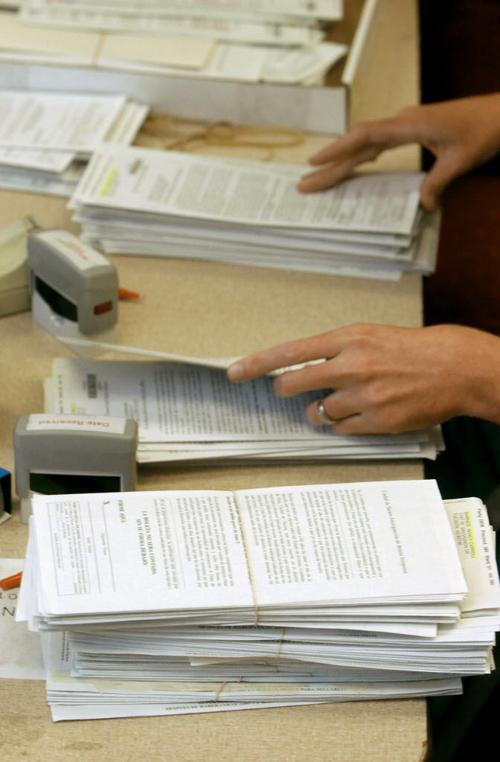PHOENIX — Federal judges will give Democrats one more chance to make their case that a state ban on “ballot harvesting” is illegal.
In a brief order Wednesday, the 9th U.S. Circuit Court of Appeals said a majority of the sitting judges want to review last week’s ruling by a majority of a three-judge panel that concluded the state is legally allowed to make it a felony for anyone to take someone else’s ballot to the polling place.
HB 2023, approved earlier this year by the Republican-controlled Legislature, has exceptions only for family members, those in the same household and certain caregivers.
Judge Sandra Ikuta, writing last week’s majority opinion, said the state has a legitimate interest in protecting the integrity of the voting process. And she said the fact there isn’t a single instance of fraud from the practice is legally irrelevant.
That 2-1 ruling left Chief Justice Sidney Thomas, to dissent, saying there is evidence that the practice the state law bans is more heavily used by minorities, making it illegally discriminatory.
Wednesday order essentially wipes out last week’s ruling against the challengers, giving them another shot at convincing the full court that the ban violates the federal Voting Rights Act. But time is running out: The election is Tuesday.
Wednesday’s decision to review last week’s earlier ruling was not unanimous, with Judge Diarmuid O’Scannlain calling the move “a serious mistake.”
“We risk creating a mess of current law by trying to produce a ruling under self-imposed time pressure,” he wrote for himself and four other judges.
He said it would be better to allow Tuesday’s election to take place with the ban on ballot harvesting in place. O’Scannlain said that would allow courts to see how the law is implemented, see whether it is discriminatory, and then make a ruling on its legality ahead of the next election.
The action comes as arguments are scheduled for Thursday, Nov. 3, in Phoenix on claims by Democrats that the Arizona Republican Party, the Trump campaign and their allies are planning to intimidate voters going to the polls Tuesday. That would include people who otherwise might have given their early ballots to someone else but now have to deliver them personally.
Meanwhile, another federal judge in Phoenix is weighing a bid by Democrats to ensure that those who registered to vote on Oct. 11 should be allowed to cast a ballot this year. Secretary of State Michele Reagan wants the court to enforce the Oct. 10 deadline even though that was both a federal and state holiday and some options to register to vote on that day were not available.
And a ruling is awaited from the same three-judge panel of the 9th Circuit that decided the ballot harvesting case, this time on the question of whether the state should be required to count the votes of ballots cast at the wrong precinct.
Unlike many other states, Arizona allows all voters to request that a ballot be mailed to them ahead of each election. Voters can fill it out and mail it back, take it to an early voting site ahead of Election Day or take it to any polling place on Election Day.
The other option until this year was to give it to someone else to return.
Both Republicans and Democrats have done such “ballot harvesting” in prior years. But the Democrats and allied groups have been far more successful at going door-to-door close to Election Day and collecting the ballots that may be sitting on a table that are now too late to be mailed.
There already are laws that make it a crime to tamper with anyone else’s ballot or refuse to turn one in.
Proponents also provided no evidence of fraud.
About the closest came from Sen. Don Shooter, R-Yuma, who said he had heard that some groups were collecting early ballots, steaming them open and then deciding based on what they found whether to submit them or toss them. There was never any proof of such an incident.
And Rep. J.D. Mesnard, R-Chandler, argued during debate the lack of evidence does not matter.
“What is indisputable is that many people believe it’s happening,” he said in voting for the measure. “And I think that matters.”
It was that logic adopted by Ikuta in last week’s majority ruling last week.
“Legislatures are permitted to respond to potential deficiencies in the electoral process with foresight rather than reactivity,” she wrote.
Thomas, in his dissent, said the practice will impact minorities more than other groups.
“There are many burdens and challenges faced in Arizona by Native Americans, Hispanics, African-Americans, the poor, and the infirm who do not have caregivers or family” to take their ballots to the polls. “With HB 2023, Arizona has added another: disenfranchisement.”
How the full court feels on the issue of discrimination is crucial: Any effort to overturn a state law as violating the federal Voting Rights Act requires proof that the measure has a disparate impact on minorities.
At least one judge who was not part of the original panel already has taken sides.
Judge Stephen Reinhardt, voting to review last week’s ruling, called it “an urgent case of extraordinary importance involving the suppression of minority voters on the eve of a presidential election.” And Reinhardt said it appears to him the law is illegal, citing the potential penalty of one year in prison for someone who does nothing more than take another person’s ballot to the polls.
“The record in this case fully documents the disparate burden that this new law imposes on minority voters,” he wrote.
The question of the ban on ballot harvesting has at least an indirect link to the lawsuit the Democrats filed earlier this week to halt what they claim will be voter intimidation.





